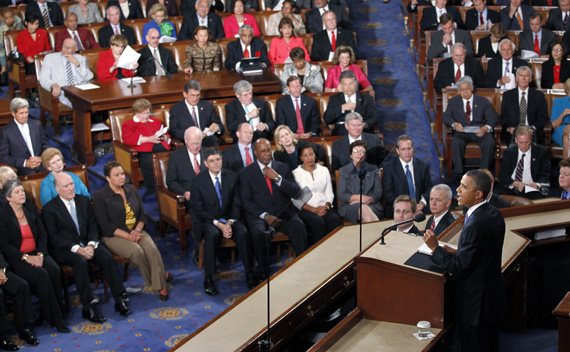More on:

The Obama administration has always been conflicted about free trade agreements. Candidate Obama didn’t outright condemn the Korea-U.S. Free Trade Agreement (KORUS-FTA), but he publicly let it be known that it could stand some improvement while privately offering body language suggesting support for free trade. The inheritance of the deepest recession and unemployment levels in decades conspired against consideration of FTAs as the administration poured itself into the task of getting Congress to pass the stimulus package.
During his first trip to Asia in November 2009, President Obama got an earful from Asian leaders who were aghast at the apparent absence of a U.S. trade policy, widely viewed as a strategic necessity to counter Asia’s growing trade dependency on China. The best stop of the trip was Seoul, and Lee Myung-bak’s primary request was support for the KORUS-FTA. Despite positive body language and the appearance of a commitment from President Obama to get KORUS done, nothing happened. No exchanges of negotiators ensued.
The 2010 State of the Union Address again provide false hope to Koreans and Asians who view FTAs as a necessary foundation for ensuring American strategic presence in Asia. The president pledged to double exports in five years, but could barely utter the words “free trade agreement.” FTA proponents cheered the export drive as a win-win approach that would create jobs and balance American deficits. Again, nothing happened.
By the end of 2010, President Obama found himself in Seoul once again for a G20 meeting at which South Korea constructively attempted to support U.S. efforts to address global imbalances. But efforts to jumpstart discussions to improve provisions of KORUS that had been negotiated by the Bush administration were too little, too late. The failure to achieve an agreement in time for the G20 was a setback for South Korea’s president, but both sides persisted in negotiations that addressed provisions of the agreement deemed unsatisfactory by Congressional critics. Automobile and labor sector opposition was muted. The agreement had been concluded, but KORUS got hung up in fractious politics over trade policy in the spring, then squeezed out by the debt ceiling confrontation in the summer.
The spectre of Lee Myung-bak’s state visit next week has finally served as the catalyst for the White House to submit FTA legislation to Congress on October 3rd. The White House and Congressional leaders have agreed to a tortuous process that links passage of Trade Adjustment Assistance to the passage of the KORUS, Colombia, and Panama FTAs as a package. It is doubtful whether passage of the FTAs can be completed in time for President Lee’s visit, or what President Lee should say in his address to a Joint Session of Congress planned as part of the trip. So much political baggage has been loaded onto the back of KORUS its passage is not secure despite bipartisan support for this agreement with an ally that needs a counterweight against the centripetal force of China’s growing economic influence.
In truth, the biggest problem with the KORUS-FTA is that it is poorly named. In Asia, trade liberalization and the strengthening of norm-based trade liberalization is badly needed as an antidote to China’s mercantilist tendencies. This means that the KORUS-FTA is the load-bearing beam that is essential to the rest of U.S. economic strategy in East Asia, including the Trans-Pacific Partnership, which is the Obama administration’s effort to develop a multilateral economic strategy in East Asia.
Given that Asia is the locomotive for global economic growth, trade and investment with Asia are essential strategic elements of U.S. policy. Asian leaders clearly see this truth and desperately need the United States to have a coherent trade and investment policy as a means by which to ensure that their growth is sustainable, and does not devolve into beggar-thy-neighbor policies. The person most responsible for making progress toward the establishment of such a strategy during the past three years is Lee Myung-bak. Given U.S. paralysis and gridlock on these issues, Lee is America’s free trade champion.
More on: